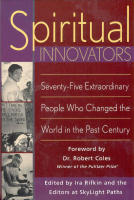Section |
Spiritual Innovators 75 Extraordinary People Who Changed the World in the Past Century Global Village - Part 1 East / West Interchange & Ecumenical Cooperation |

Back to Index
|
 Back to Index |
| Section Introduction Notes | Discussion Highlights |
| Before we deal with this important theme, some background is in order.
... Wayne Holst Syncretism: a definition (good, bad, or how the world works) The attempt to combine different or opposite doctrines and practices especially in reference to philosophical and religious systems. Attempts to unify cultural forces. A fusion of beliefs and practices. - Oxford Dictionary of the Christian Church The Question of Other Faiths: Consider how Christians have historically related to people of other faiths. Traditionally, they have followed biblical precedent and taken essentially three approaches: - shunning - conversion - seeing God at work in the other Shunning: This form of relating to people who follow other than the religion of the *true believers* can be found in the lesser Hebrew prophets like Zechariah and sections of the book of Revelation in the New Testament. Conversion: Asserting the superiority of Christianity over others. Attempts to convert others - sometimes using force, sometimes through preaching, apologetics (arguing defensively) and service projects; building and running schools or hospitals. (There is a special situation existing between Christians and Jews. Many of the New Testament books, including the Gospel of John and some of the New Testament letters, portray the Jews in a perjorative fashion. European history over the past two millennia suggests Christian approaches to the Jews varying from forced conversion to extermination to inter-faith dialogue). Seeing God at Work in the Other: The third classic approach, affirmed in scripture is to see God at work in other people outside the church (Romans 1, Acts 17, Matthew 15:21-28). There are various expressions of this third approach. For example, universalism. Accordingly, all the major religions, not just Christianity, are valid paths to God. Dialogue allows us to blend the various points of view into a new, higher synthesis. Problems: syncretism - implies the discounting of Christian or other faith uniqueness. Also, if we claim that all religions are paths to one God, how do we know this. Is it not arrogant to claim that other faiths are as good as mine. Summary: The Spirit of God is not confined to the Christian Church. We must not engage other faiths with an attitude of superiority. We need to approach others as Jesus did (eg. the Canaanite woman story, Mt. 15 above) with an attitude of humility. Relate to persons of other faith traditions in a spirit of openness to what we can learn from them, but also with a confidence in the Christian faith that we claim as our own. A Case History of the Meaning of Interspirituality: Desmond Tutu's Golden Rule - Blending both indigenous and Christian spirituality. Ubuntu - a Zulu word derived from a traditional phrase meaning - A human is human because of other people. Throughout his experience with South African apartheid, Tutu worked on the idea of combining the African concept of human society as something primary and organic with the classic Western Christian concept of the primary value of the individual. In other words, for Tutu, the individual and society are so tightly interconnected and interwoven that it is not possible to deal with the one without the other. Individual justice and healing can only occur when there is societal justice and healing. The goal was not to seek out and punish those who perpetuated evil in the era of apartheid. The goal was to allow the wrongdoer to acknowledge what was done in the presence of those victimized and to have the wrongdoer hear the story of how his actions affected the victim and those in the extended family of the victim. The result could be healing for victim and victimizer alike, and by implication for society as a whole. Tutu's theology formulated the basis for the Truth and Reconciliation Commission and its marvelous results in South Africa. Ubuntu is a form of spirituality that implies the basic connectedness of all human beings according to Gods plan for interdependence and harmony throughout Creation. The value of healing both the individual and society is captured in this ingenious, interspiritual blending of indigenous and Christian values. Through the Truth and Reconciliation Commission (1995) Tutu acted as both political and spiritual agent for its ideals. The commission's mandate was to promote national unity and reconciliation in a spirit of understanding the conflicts and divisions of the past. Tutu made it work. He did it by integrating African ubuntu with what might be defined as Christian or spiritual ubuntu - acknowledging the paramount health of the community without discounting or denigrating the individual. To those victims who wanted retribution, he spoke of that kind of justice being competitive and selfish, in contrast to Gods interdependent creation and ubuntu's human collectivity. Forgiveness, in Tutu's spiritual framework acknowledges God's sovereignty, because judgement resides in God alone, who in turn commands all to repent. |
|
| Another Life whose inspiration was the Golden Rule was Hans Kung (p 110), the Catholic Theologian. Here is a link to his famous short paper "Declaration Towards a Global Ethic", delivered in 1993 to the Parliament of the World's Religions in Chicago. This paper led to the founding of the Global Ethic Foundation which carries on a grand work in "inter-cultural and inter-religious research, education and encounter". | |
Discussion Highlights:
|
|
| Clicking the icon left will activate the e-mail on your machine and direct your comments to us. Comments are welcome and will be posted with usual editorial courtesies. | |
St. David's United Church.Calgary, Alberta, Canada.
The United Church of Canada.
September 29, 2002